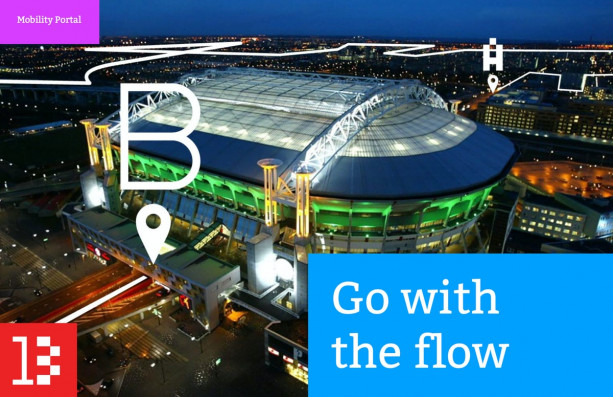Stay in the know on all smart updates of your favorite topics.
Are you interested in the experiences of others working in smart city projects and organizations? The Smart City Academy provides available knowledge about smart city projects and can help you with project development. This Smart City Academy page provides you with information and researches about the impact and conditions of smart city projects. Professors, teachers and students study the initiation, management, collaboration and scaling of smart city projects and would like to share these results with you. They do so by organizing events and masterclasses, by developing smart city tools and methodologies and by making research and outcomes accessible. You can find everything here. And the good news is.... You can add your knowledge too! Are you working on Smart City research? Please feel free to share your knowledge in the Academy section, under ‘Other research and theses’. The Smart City Academy is powered by the Amsterdam University of Applied Sciences. If you have any questions, you can contact smartcityacademy@hva.nl
GoodCode - Coding for change

Ideas and entrepreneurship for positive impact are gaining momentum. There are a lot of ideas with great potential, but often they lack tech knowledge needed to get them off the ground.
GoodCode aims to bridge this divide by organising events that bring together people with programming skills and people keen to solve society's biggest challenges.
After the success of the first GoodCode event, we're excited to host another at Impact Hub Amsterdam. This is also part of Impact Hub's Workbench series of monthly workshops for entrepreneurs who want to take their start-up to the next level!
During the evening you can also crowdsource solutions to your most pressing question by engaging the other participants!
The program schedule is:
18:30 Walk in
19:00 Opening
19:10 First speaker: Samuel Goodwin, Developer
19:30 Second speaker: Maurits Bos, Lawyer at Benvalor
19:45 Third speaker: Laurens Slats, Global Community Manager at The Things Network
20:00 Workbench
21:00 Drinks and chatting and small informal pitches
Hope to see you there!
Circular Expo

A temporary exposition from 9 till 27 October in the Herstelling at the Town Hall to provide practitioners of circular projects in the city and the municipality Amsterdam a place to show their work and take the spotlight. Learn what a circular economy is and how the whole city is working on becoming and staying circular.
Opening 9 October
End 27 October
Special program follows later
Do you have an innovative circular product or project and want to show it at the circulair expo? Contact Ward Mesman at w.mesman@amsterdam.nl
Amsterdam – A Data-driven City Of Europe
The smart city projects of Amsterdam overlay 8 primary categories that include big and open data, smart infrastructure, smart mobility, smart economy, smart society, smart areas, smart living and living labs.
The secret to citizen engagement. Lessons from a Manchester success story.
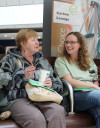
Does your project’s success depend on the involvement of citizens? But are you struggling to interest or motivate them?
In Manchester, Dave Coleman and his team have developed a method with which they have so far managed to excite and engage over 4.000 people about climate change. Not just the usual suspects, but people from all walks of life, such as Somali refugees, unemployed social housing tenants and children.
Curious to know what their secret to success is? Read it here
A few minutes ago we were all nodding our heads in agreement but now everyone in our meeting room fell silent. None of us had an answer to the question that had just been raised: “Involving citizens is important to our project but how do we make it happen?” As the silence continued, I realized: we are all citizens ourselves but as professionals we struggle with how to get ‘them’ on board with ‘us’. How odd…
Citizens never really central and seldom part of project partnership
When I started doing a bit of research on the subject, I found out we were not the only ones having a hard time. Recent research on smart city projects from the University of Amsterdam (UvA) said: “In most smart city definitions, citizens are considered to be the key users and should be the main focal point for the smart city technologies that are being developed. In the projects we evaluated, we rarely found evidence of this. Citizens were never really central and seldom an official part of the project partnership”
I sighed with relief - thank goodness, it’s not just us! Apparently many of us working in energy transition or smart city projects struggle when it comes to engaging citizens.
But off course that wasn’t actually good news. If we want to create change, and have an actual impact, we need people to (want to) join our projects or causes. But how?
Good communication alone is not citizen engagement
For many of us it’s common practice that, after the project is carefully planned and designed, we bring in the creatives and ask them to develop a sticky campaign to arouse citizen enthusiasm and involvement. When this doesn’t get the response we hoped for, we blame the campaign. This, as it turns out, isn’t quite fair (according to the UvA research):
*“Often assumptions were made about what citizens wanted or needed, without being thoroughly verified by consultation with those citizens. Moreover, many mistakes were made in determining the way of involving users in the project.*”
So, as communications expert Alec Walker-Love[1], working extensively on the subject, puts it: “Citizen engagement requires good communication – but good communication alone is not citizen engagement.”
So what is? What is the secret to citizen engagement? The subject started to feel like a mysterious black box to me; what on earth gets citizens going? Or, even better, gets them to stand still and reconsider their thinking or behavior?
Involving over 4.000 ‘unusual suspects’ in climate change
Salvation came unexpectedly. Last March, when visiting Manchester, we had the pleasure of meeting Dave Coleman co-founder and Managing Director of the Carbon Literacy Project (and member of our City-zen Advisory Board). He amazed us. With the Carbon Literacy Project he had so far managed to excite and engage over 4.000 people (!) in and around Manchester about climate change. Not just the usual suspects, but people from all walks of life, such as Somali refugees, unemployed social housing tenants and children. I couldn’t wait to get the inside line from Dave to how this was done. Fortunately he was willing to share it all.
The Carbon Literacy Project emerged from Manchester’s climate change action plan ‘Manchester: A Certain Future’, written in 2009. Next to an ambitious goal for reducing the city’s CO2 emissions, the plan pledged to ‘engage all individuals, neighborhoods and organizations in Manchester in a process of cultural change that embeds ‘low-carbon thinking’ into the lifestyles and operations of the city’. You can’t however expect a process of cultural change to happen if people don’t have enough knowledge or understanding of the carbon impacts of their activities. So one of the objectives of the plan was to make people ‘carbon literate’.
In 2010 Dave and his ‘Cooler Projects’ business partner Phil Korbel, decided to take up the carbon literacy challenge. Because, as Dave put it; “if we want change, we need people to just get it”.
The Carbon Literacy Standard: anything but standard

This was no easy task. The aim, as formulated in the plan, wasn’t to develop some kind of awareness campaign but to offer every citizen within Greater Manchester ‘one days’ worth of learning’ about climate change. Dave and Phil brought together a voluntary 30-person working group, consisting of people drawn from all sectors, to work collectively in developing an approach to engage people. They called it ‘The Carbon Literacy Standard’. Their approach however is anything but ‘standard’. Instead of developing an ‘off-the-shelf’ training course to make people ‘carbon literate’, they decided to create a different kind of program. One that turned out to be very successful because it has adopted a very distinctive (learning) method. A method in which people not only gain knowledge about climate change but actually become involved in the subject and start to care about it.
3 ESSENTIAL LESSONS FROM MANCHESTER
So what is their method all about? How do they manage to turn those heads around and influence behavior? The answer is both short and simple: by putting those they want to reach at the heart of everything they do. They don’t focus on what they want or think is important but on what is meaningful to others and works for them. Is it that simple? Yes it is. The hard part off course is in actually doing it. And how. Here are three key elements the CLP works by that are universally applicable to every project whose success depends on engaging others:
1. Always speak in terms of the other man’s needs
At the Carbon Literacy Project they focus on what they call ‘local learning’: trying to make whatever you are trying to teach (or tell) as relevant as possible to the person at the other side of the table. “Nobody will show up just to talk about climate change” Dave explains “it all starts with finding common ground. Talk about something they are interested in and show them how climate change is tied up with that.”
Dave illustrates this with an example: How do you reduce the number of FC United fans driving to soccer games? Not by telling them it is better for the environment to take public transport but by talking about things they care about: “take the Metro and everyone can have a beer, you travel together with your mates, you will save a few pounds and you don’t have to worry about finding a parking spot…. “ Or by enhancing their pride of FC United: “our club is doing something about climate change and we are going to do it much better than others.”
Dave emphasizes that is important to “always speak in terms of the other man’s needs” referring to one of the principles from Dale Carnegie’s famous book ‘How to win friends and influence people’. “Ask yourself; what are they interested in right now? And then try to find the overlap. It is all about shaping it into somebody else’s needs or interests.”
Dave’s words remind me of a quote by another bestselling author[2]: “First seek to understand and then to be understood.” If you want to engage people into whatever your cause is, first make an effort to immerse yourself in what is important to them. Only then you will know how to spark their interest. Now of course that isn’t always easy but it will pay off; it will earn you people’s attention and willingness to be involved in your project.
2. Invite those that are essential to your project in from the start
At the Carbon Literacy Project they believe they can’t know what kind of training works best for you, your group, community or organization. What works well in one group or community might fail in another. That’s why they have embraced a concept that Dave calls ‘crowdsourcing the training’. Which means you – the person working to achieve Carbon Literacy in your group - get all the help and input you need, but you customize the training for your group and, whenever possible, deliver it yourself too (more about that in #3). As Dave says: ““We don’t focus on form but on outcome”. They trust that, with the right guidance, these ‘trainers’ will be able to put together a better working training program, fitting the needs and interests of their own group, than CLP would have. And thus creating a better outcome.
In addition, they emphasize the importance of a concept called ‘group enquiry’. This means that during a training you do not tell people what to do differently to reduce their carbon impact but you let the learners, with input of expert knowledge and peer support, jointly find their own answers and devise their own solution. Or as Dave puts it: “We just create the space, provide the necessary knowledge and people find their own way to the answers” This maximizes the participants’ sense of independence, expertise and purpose in responding to climate change and thus will increase ownership and their motivation to act further.

So how does that translate to us working in smart city or energy transition projects? If you want to influence people’s thinking or behavior, do not only immerse yourself in what is important to others but also invite them in from the very start. Don’t try to put it all together by yourself first and then reach out, but work together with those that are essential to your project from the very beginning. You can be the driving force but put your ego aside: be open to unexpected ideas and approaches of others. This will not only create a better outcome but it will also boost enthusiasm and ownership with those that are essential to the success of your project.
3. Focus on a peer-to-peer approach
At the Carbon Literacy Project they believe that “training is most trusted and best delivered by peers”; people who, to the learner, “feel like themselves”. Dave explains: “Information becomes more credible when it is told by peers, by ‘people-like-you’, not some expert talking down. I, for example, wouldn’t be credible to most soccer fans. I simply don’t look and sound the part. It’s better to take somebody they already respect. Someone they share a common background with. Research shows that peers are the most trusted source of information” That’s why Carbon Literacy training is mostly delivered by someone from the group it focuses on.
So, if you want people to be open to your project, work together with a few (respected) members of that specific community. Find likeminded people and involve them as your local ‘ambassadors’ and work together from the start in formulating your message and determining the way of approaching people.
Stating the obvious?
Now to many these three lessons from Manchester might feel like stating the obvious. Nothing new. And you are right. Deep down most of us already know these things. And that’s great. But we don't always do them. Now what it takes is courage. Courage to start putting what we know into practice. And making an effort to really connect. Because, let’s face it, engagement is a two-way activity. And it starts with us.
[1] Alec Walker-Love is co-writer of ‘Report on innovative citizen engagement strategies’.
[2] Stephan Covey - ‘7 habits of highly effective people’
PostNL Mailmen inform citizens about activities in the neighborhood

Almost half of the citizens of Amsterdam is lonely. Therefore, Amsterdam has set up a network of stakeholders who want to fight loneliness. Cordaan and PostNL are part of this network. We see many activities that are already organized for people, that can help them to deal with loneliness. Cordaan, for instance, organizes daily activities for seniors. However, citizens are not always familiar with the possibilities to get help and the activities that are organized for them in their own neighborhoods. Only people who actively seek help themselves or get help via their general practitioner or family now profit from the help organized by welfare organizations.
To increase awareness about these activities and possibilities, and eventually increase participation, Cordaan and PostNL work together in a new experiment. This experiment is one of the 39 out of 116 experiments selected by the municipality to decrease loneliness in Amsterdam. Cordaan and PostNL will focus on lonely seniors. Cordaan will make a selection of addresses of possibly interested senior citizens in Banne Buiksloot in Amsterdam Noord and will inform them about the experiment by mail. A week later, the mailmen will ring the doorbell and ask questions such as: ‘Do you know about the activities organized for you in your neighborhood?’; ‘Would you like to participate in these activities?’; ‘Would you like to talk about the activities and possibilities with an employee of Cordaan?’. If the last question is answered with a ‘Yes’, an employee of Cordaan will make an appointment with the senior to determine which activities or what help would be suitable for that individual person.
PostNL investigates how it can react on a changing society by investigating new ways to leverage it’s network, with over 20.000 mailmen. This new role for the mailmen holds numerous advantages. The mailmen are well-know in the neighborhood and work for a trusted brand. Therefore, we believe people will be more inclined to answer their questions at the door, than they would be if the person at the door were a complete stranger. In addition, the mailmen are not affiliated with a healthcare or welfare organization, and can start a conversation from a more neutral perspective. Therefore, with this cooperation between Cordaan and PostNL, we hope to reach more seniors who would benefit from the activities and possibilities in the neighborhood. Eventually, we hope to decrease loneliness of senior citizens by increasing their network in the neighborhood and their participation in that network.
Wanted: more assignments for Futureteams

Every organisation can come across a problem they need help with. Maybe Futureteams can assist! To prepare Business and Management students of the Amsterdam University of Applied Sciences for a future in Business they have the opportunity to work as a consulting agency, Futureteams, and solve real problems organisations might have. We are looking for organisations in the fields of: Health, Mobility, Tourism, Smart Cities or Financial Services.
Joep de Hoog has had a lot of response, but has room for a few more, you can sign in untill the 25th of September.
The students will put in effective work hours and there is no need for training or a work space. You can find more about the project on https://amsterdamsmartcity.com/projects/futureteams-can-take-on-new-assignments or here:
https://sites.google.com/enmeer.com/wervenopdrachtgevers/home (in Dutch)
CODALoop Amsterdam
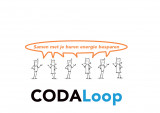
CODALoop is a EU-funded research project and a joint venture of different academic and non-academic partners in three countries, The Netherlands, Austria and Turkey and four cities, Amsterdam, Graz, Leibnitz and Istanbul. CODALoop Amsterdam is active in two neighborhoods, the Indische Buurt and Buiksloterham.
There is a tremendous urgency to reduce energy consumption to guarantee quality of life for future generations. In the light of the weak results of behavioral approaches and top-down investments on infrastructures for energy efficiency, such as grid management, smart meters and the like, innovative approaches to tackle this issue are required. CODALoop Amsterdam is a research project which uses a sociological approach and explores the extent to which social interactions, at the level of the neighborhood, are able to activate ‘energy consciousness’.
Het Vuilrak

On a location in Haarlem we focus on co-creational development of circular solutions for businesses.
The Great Bubble Barrier
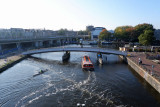
Every year, more than 8 million tons of plastic pollution ends up in our oceans of which 60-80% originates from rivers. Plastic does not biodegrade and causes great harm to the environment. Marine life gets entangled in plastics, vessels get damaged and microplastics form a health hazard for the smallest to the largest organisms. The Great Bubble Barrier has developed a technology which can intercept plastic pollution in rivers before it reaches the ocean: the Bubble Barrier, a bubble curtain with a catchment system.
The first long-term Bubble Barrier in the world was placed in November 2019 at Westerdok in Amsterdam.
Watch the video of Bubble Barrier Amsterdam.
THE BUBBLE BARRIER SYSTEM: HOW DOES IT WORK?
The bubble curtain is created by pumping air through a perforated tube on the bottom of the waterway. We make use of the natural flow of the river. The plastic waste will be directed to the side and into our catchment system at the riverbank, where it will be retained and removed from the water.
- It does not hinder ship traffic
- It covers the full width and depth of the waterway
- It allows fish to pass
Visit the Bubble Barrier Amsterdam at Westerdoksplein.
Will the next Bubble Barrier be in your river or city? Send The Great Bubble Barrier a message!
Call for Smart Cities Experts: Research on evaluation-prioritization of smart cities projects
The aim of our research is to record experts' opinion about the importance of each action/project that has been collected and categorised.
Please evaluate the importance of each action regarding its possible contribution to making a city smarter (or more sustainable, consuming fewer resources, with the use of ICT). You may also recommend actions, filling in the appropriate space (other actions) in each category. Please consider that you are giving your expert opinion for a medium-sized city, in a rather early-stage of ICT development.
We would be grateful if you could contribute with some of your knowledge to our research.
Link for the questionnaire for smart cities experts: https://t.co/UfJEnaVOL1
Thank you in advance for your time and help,
Nikolaos Vogiatzis (icsdm15021@aegean.gr)
Dimitrios Kolokotronis (icsdm15028@aegean.gr)
Social Mobility Rotterdam

In collaboration with the Dutch Ministry of Infrastructure, we are working on a new opportunity for social mobility. It is a program that supports start-ups (as well as other companies with a start-up service) who have a service in the field of Social Mobility. Social Mobility is about mobility services that can create social impact, either by servicing the less mobile users, the ones with less financial means, addressing loneliness, lack of education…etc. For example, think of people that need the soup kitchen or the salvation army but can’t afford getting there, or people that cannot go to job interviews because they can't afford the transport to get there and are therefore stuck in a vicious circle of poverty.
We are looking for social (mobility) entrepreneurs, testers and investors:
1. Social entrepreneurs: If you are or know of start-ups that have such social mobility services that would be interested in developing them, testing them with users, finding investment and scaling, please let us know! P.S: We are not only looking for start-ups, we are also welcoming established companies that have a 'start-up level' service.
2. Testers: they can be the end-users themselves or in-between organisations, such as the Salvation Army for example, which would have access to a large group of end-users. Do you have contacts of know someone that would be an early adopter of such innovative social mobility services, please put us in touch.
3. Investors: we are also looking for investors that would be interested in investing in social entrepreneurs to help create social impact. Do you have contacts or know a party that could be interested, please put us in touch.
stephanie.hughes@akkaarchitects.com
Here you can see an earlier version of this program: http://www.rotterdammobilitylab.nl
Sustainable Storytelling with Team Solar Flora
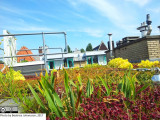
The role of the storyteller is to translate information into something that humans react to on an personal level. To develop narratives that engage us deeply to help us better understand the world.
For this summer academy project, the team Solar Flora search for an ongoing projects at Amsterdam Smart City platform and found the Rooftop Revolution then we decided to go for the topic Rooftop gardens. We contacted an enthusiast in Amsterdam and created the story.
MensenWerk: Planning for the Future of Urban Living
The work landscape is changing rapidly. The future workplace is becoming less predictable with flexibility, democratization and robotization as key words of the ongoing change. How can spatial planning follow and adapt to these rapid economic and technological changes remains a critical question. SPCitI most recent research project looks exactly at that.
Wanted: real assignments for student consulting agency
To prepare Business and Management students of the Amsterdam University of Applied Sciences for a future in Business they have the opportunity to work as a consulting agency, Futureteams, and solve real problems organisations might have. We are looking for organisations in the fields of: Health, Mobility, Tourism, Smart Cities or Financial Services.
If you have an organizational problem, Futureteams can help! They will put in effective work hours and need no training or work space. You can find further information about the project https://amsterdamsmartcity.com/projects/futureteams-can-take-on-new-assignments or here:
https://sites.google.com/enmeer.com/wervenopdrachtgevers/home (in Dutch)
Mid-scale waste-to-value transformers, on-site

Turn your last-night leftovers into energy that powers your household!
The Waste Transformers was started in 2012 by Lara van Druten. Lara had one goal: to create a flourishing business that inspires others to change the way that they deal with waste and to establish a business model able to balance financial, social and environmental returns. Today, the Waste Transformers are the recognised partner of choice for those with the ambition and courage to realize real, circular economies around waste.
The Waste Transformers creates another small-scale circular economy in Amsterdam
Can start-ups help to make the city more attractive?
Can start-ups help to make the city more attractive? Luis Carvalho and Willem van Winden (Amsterdam University of Applied Sciences) draw lessons from Amsterdam’s “Start-up in Residence” programme.
Amsterdam is exploring ways to engage start-up companies in the development of new solutions for urban problems and challenges, ranging from reducing bicycle theft, separating waste streams more effectively, or promoting alternative tourism. We analyse this new practice and its impact, by interviewing opinions and experiences of startups, city departments involved, and experts.
We derive recommendations for improvement and practical guidelines for other cities that may want to start a similar programme.
The results will be elaborated in a paper, to be presented at the prestigious RENT conference in Lund, Sweden. http://www.rent-research.org/rent-xxxi
Master Thesis - Governance Focus
Hi everyone! I am current Business Master student. I am doing my master thesis focusing the ASC as a case study. My main interest is to understand how the ASC is structured in the governance field and how the municipality is involved to create this innovative environment. The thesis is part of an University of Sao Paulo research group. @Esther Somers could you help me to get in contact with someone that would contribute to improve this research development
Smart City Dialogue: The role of big companies in the Smart City

Companies shape the cities we live in. Especially larger companies have the capacity to invest, the ability to scale up new technology and a strong interests in getting involved in public private partnerships. For them, smart cities are increasingly becoming an attractive growth market. For governments these larger companies are attractive partners. Indeed, companies are involved in a lot of smart city projects in Amsterdam.
Companies play their role in smart cities in ways that may be described as ‘politics with different means’. They develop algorithms that define how citizens are nudged towards particular kinds of behavior. They try to set standards for the future. They are given access to data that they may also use for investment decisions. They provide services that may render public services obsolete.
Our next smart city dialogue is about these roles played by companies in public-private partnerships and the relation between these partnerships and representative democracy. Do public-private partnerships indeed bypass democratic politics under the label of smartness and innovation. If so, how can elected politicians control and hold companies accountable? Or are representative democracy and public private partnerships complementary modes of governance that each act on their own kinds of challenges?
Speakers:
Willem van Winden, Daniel van der Buusse, Roel Nahuis and Wieke Schrama
Interesting for anyone working within but also with these bigger companies in Amsterdam smart city! Join the smart dialogue on the 12th of sept at the Amsterdam University of Applied Science from 3 – 5 PM. Wibaustraat 3b, room 05A26.
Please register by emailing to smartcityacademy@hva.nl
Stay up to date
Get notified about new updates, opportunities or events that match your interests.

